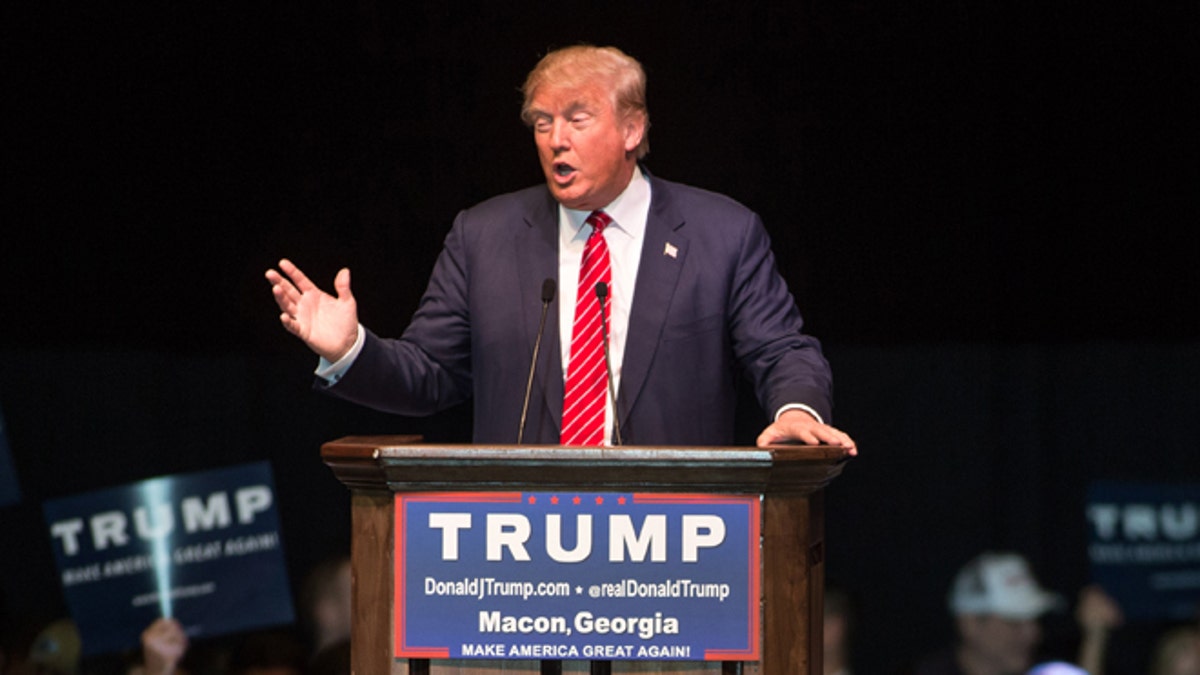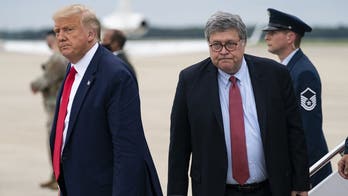
Republican presidential candidate Donald Trump speaks during a campaign rally at the Macon Centreplex, Monday, Nov. 30, 2015, in Macon, Ga. (AP Photo/Branden Camp)
The Summer of Trump was expected to be a passing thing – destined to change along with the color of fall leaves.
But that was followed by the Autumn of Trump, which was followed by the Winter of Trump, which seems to be ushering in the Spring of Trump.
Billionaire Donald J. Trump, one of the most renegade presidential candidates in recent memory, still has heads spinning nearly a year after launching his campaign and being dismissed as a sideshow by many in the political world.
At Thursday's Republican presidential debate, the Republican candidates grasped for the middle ground, drastically dialing back the vitriol and trying to instead politely poke holes in Trump's policy proposals.
At times, their approach succeeded in spotlighting Trump's frequently vague ideas for addressing the nation's problems. But they also gave the mogul space to sound more measured — almost presidential — at a time when he's already started eyeing the general election.
"We're all in this together," Trump said. "We're going to come up with solutions. We're going to find the answers to things."
Maybe so, but Trump remains the winner in most national and state polls of likely GOP voters, often leading others by double digits in the ever-shrinking field. Trump walks through the minefield of his own jaw-dropping comments and controversies without as much as a scratch, while those who suffer mortal wounds tend to be the rivals who try to take him down.
He has won more primaries – and, by extension, delegates – than his competitors, and polls for next Tuesday’s contests show a strong likelihood that he could beat two of his remaining rivals in their own home states.
The civil exchange in Miami marked a sharp course correction after the previous GOP debate, which devolved into a series of personal insults that left many Republicans cringing. Florida Sen. Marco Rubio led that insult barrage, and then faltered badly in the primary contests that followed.
Rubio now says he regrets his behavior which embarrassed his children.
Thursday's debate, the 12th for Republicans this primary season, came at the most pivotal moment of the tumultuous race.
Rubio and Ohio Gov. John Kasich, the last two candidates who have backing within the Republican establishment, face sudden-death primaries in their home states on Tuesday — a pair of winner-take-all contests that could begin to put Trump's lead out of reach.
Cruz is closest to Trump in the delegate race and suggested again on Thursday that Rubio and Kasich step aside to allow him to take on the real estate mogul one-on-one. After a reserved start to the debate, Cruz grew more aggressive during the two-hour contest and warned Republican voters that nominating Trump would cost the GOP the White House.
"If we nominate Donald Trump, Hillary wins," said Cruz, a staunch conservative loathed by many of his Senate colleagues. He also argued that the businessman was overly simplistic on everything from trade to foreign policy, saying his solutions simply "don't work."
Rubio joined in at times. After Trump suggested Rubio was being too politically correct in his comments about the importance of working with Muslims to fight terrorism, the Florida senator shot back, "I'm not interested in being politically correct. I'm interested in being correct."
But there were just as many moments when the candidates let Trump slide, including on his acknowledgement that he's exploited immigration laws to bring skilled overseas workers to the U.S. and on his call for sending as many as 30,000 U.S. ground troops to the Middle East to fight the Islamic State.
And none of the other candidates condemned Trump for comments that appeared to encourage aggressive physical action against protesters at his campaign rallies.
"Washington isn't listening to the people. And that's the frustration that is boiling over," Cruz said when asked if he was concerned about the behavior of some of Trump's supporters hurting the Republican Party in the general election.
The prospect of Trump winning the nomination has prompted some outside groups to start putting millions of dollars in television advertisements on the air to build a late case against him, including in Florida.
The ads have largely focused on Trump's questionable business dealings, including legal action against the educational for-profit Trump University. Yet none of the candidates attempted to build on those charges during the debate.
"I can't believe how civil it's been up here," Trump said midway through the debate.
Trump has been signalling a shift toward campaigning for the general election, both in tone and in substance, and Thursday's debate gave him an opportunity to further that change.
Well aware of the opposition to his candidacy from within his own party, he spoke frequently of Republican unity and urged those skeptical of him to rally around him for the good of the GOP.
"I think frankly the Republican establishment, or whatever you call it, should embrace what's happening," he said.
Based on reporting by the Associated Press.
Like us on Facebook




